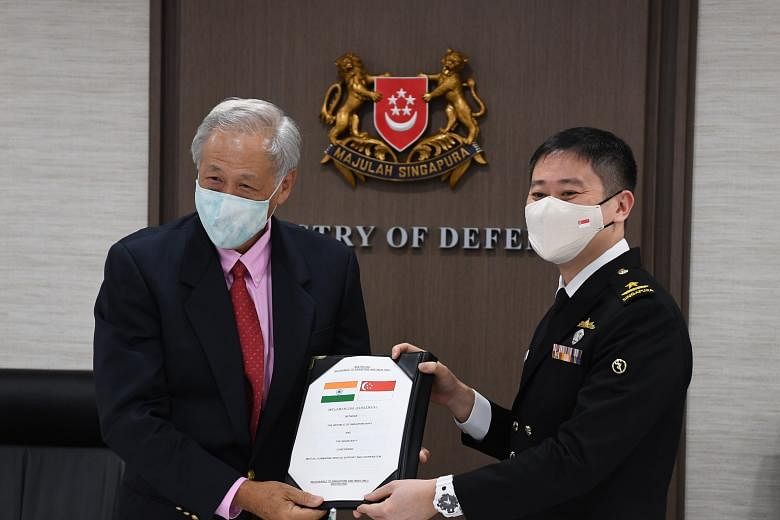SINGAPORE - Singapore and India on Wednesday (Jan 20) signed an agreement for their navies to extend rescue facilities to each other's submarines at a meeting between the countries' defence ministers.
At the 5th India-Singapore Defence Ministers' Dialogue held via video conferencing, Defence Minister Ng Eng Hen and Indian Defence Minister Rajnath Singh witnessed the signing of the Implementing Agreement on Submarine Rescue Support and Cooperation between the two navies.
The signing of the agreement reflected mutual trust and interoperability, said Dr Ng in an interview released by the Ministry of Defence (Mindef).
"When submarines are in distress, it can be a matter of life and death for the crew. This submarine rescue implementing agreement provides some assurance that depending on where submarines are, you can have partners that you can trust to extend rescue facilities when you need it. So I think this will be welcomed," he said.
Singapore currently has submarine rescue agreements with a number of other countries, including Australia, Indonesia, South Korea, the United States and Vietnam.
During the meeting, Dr Ng and Mr Singh reaffirmed the strong and longstanding bilateral defence relationship and both countries' commitment to sustain defence cooperation despite the challenges posed by the pandemic, said Mindef.
They also discussed regional security developments and acknowledged the good progress made in cooperation across the three services, and in defence technology and multilateral engagements.
Both ministers conveyed their full support for the early conclusion of agreements to facilitate the conduct of live firings and the cross-attendance of courses by officers of both armed forces, added Mindef.
Dr Collin Koh, a research fellow at the S. Rajaratnam School of International Studies, said it was not surprising that the submarine pact was signed, as both navies have very close ties.
While having such rescue pacts underline a certain measure of mutual trust and confidence, "it's one thing about signing onto the pacts and quite another about implementing them in times of a real contingency", he said.
It also does not necessarily mean Singapore seeks to operate regularly in India's waters, said Dr Koh, who specialises in naval affairs. Such pacts allow countries to seek help from Singapore, and vice versa, only in times of crisis and if there is political permission.
Given the sensitive nature of potentially intervening in another country's waters, such pacts are more likely to be technical - outlining the technical assistance that both countries can render in times of crisis, he added.
A joint statement issued after the meeting said the dialogue "continues the substantial increase in bilateral cooperation and defence partnership over the years".
The ministers welcomed initiatives to expand bilateral defence cooperation, including the Implementing Agreement on Humanitarian Assistance and Disaster Relief Cooperation signed in August last year (2020) for the two armed forces to have closer operational collaboration in disaster response and capacity-building activities of mutual interest, said the statement.
The cyber agencies of both armed forces have also stepped up engagements, it added.
Both ministers also noted the commitment of their senior officials in sustaining annual dialogues during the pandemic through virtual meetings. "This has kept bilateral defence cooperation on a positive trajectory and laid the foundations for further cooperation in 2021," added the joint statement.
Dr Ng said: "There are many new areas, including defence technology, that both sides can build shared interests and shared capabilities.
"And I would say that overall, our defence ties and military engagement with India have grown significantly, and we welcome this partnership."


